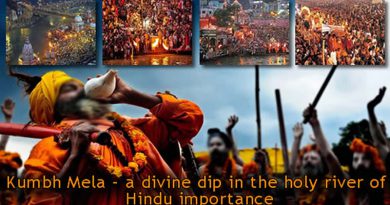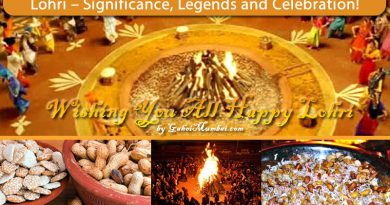Maha Shivaratri – A Hindu Annual Festival in honour of the god Shiva!
Maha Shivaratri is an auspicious festival, celebrated annually by offering flowers, leaves of wood apple or bel, milk, curd, honey, datura, bel fruit, sweet to Shiva Linga as in honour of the god Shiva. It is celebrated by worshiping Shiva and chanting sacred sound “Om” and prayers, do fasting, doing Yoga, and meditating on ethics and virtues such as self-control, honesty, non-injury to others, forgiveness, and the unearthing of Shiva. The fervent disciples keep awake all night. Many devotees visit to Shiva temples or go on pilgrimage to any one of the 12 Jyotirlinga Shrines of Shiva. In Shiva temples, “Om Namah Shivaya”, the sacred mantra of Shiva, is chanted through the day. It is celebrated in India (specially in all 12 jotirlinga), Nepal (specially in Pashupatinath Temple), Mauritius (Ganga Talao, a crater-lake) etc.
Maha Shivaratri Celebration Time and Date: There is a Shivaratri in every luni-solar month of the Hindu calendar, on the month’s 13th night/14th day, but once a year in late winter (February/March, or Phalguna) and before the arrival of Summer, marks Maha Shivaratri which means “the Great Night of Shiva”. According to the Gregorian calendar, the day falls in either February or March.
Myth and History of Maha Shivaratri Celebration:
The Maha Shivaratri is stated in numerous Puranas, particularly the Skanda Purana, Linga Purana and Padma Purana.
As per Shaivism’s legend, Shivaratri is the night when Shiva performs the heavenly dance of creation, preservation and destruction. Due to Shiva’s this holy act, devotees do the chanting of hymns, the reading of Shiva scriptures, do dance whole night and remembers Shiva’s existence all over the place.
As per to another myth, this is the night when Shiva and Parvati got married. It is an anniversary of God Shiva and Goddess Parvati wedding.
As per another legend, in the samudra manthan, a pot of poison emerged from the sea. This scared the Gods and demons as the poison was capable of ending the entire world, and they ran to Shiva for aid. To protect the world from its evil effects, Shiva drank the deadly poison but held it in his throat instead of swallowing it. This made his throat turn blue, and he was given the name Neelakantha, the blue-throated one. Shivaratri is the festivity of this event by which Shiva saved the world.
As per another legend in the Shiva Purana, once the other two of the trios of Hindu Gods, Brahma and Vishnu, were fighting over who was the greater of the two. Shocked at the intensity of the fight, the other gods requested Shiva to interfere. To make them understand the uselessness of their fight, Shiva assumed the form of a huge column of fire in between Brahma and Vishnu. Awestruck by its magnitude, they decided to find one end each to establish supremacy over the other. Brahma assumed the form of a swan and went upwards and Vishnu as Varaha went into the earth. But light has no limit and though they searched for thousands of miles, neither could find the end. On his journey upwards, Brahma came across a Ketaki flower floating down slowly. When asked where she had come from, the Ketaki answered that she had been placed at the top of the fiery column as an offering. Unable to find the topmost limit, Brahma decided to end his search and take the flower as a witness. At this, the annoyed Shiva unveiled his true form. He punished Brahma for telling a lie, and cursed him that no one would ever pray to him. The Ketaki flower too was disqualified from being used as an offering for any worship, as she had testified misleadingly. Since it was on the 14th day in the dark half of the month of Phalguna that Shiva first established himself in the form of a Linga, the day is especially auspicious and is celebrated as Mahashivaratri for happiness and prosperity.
As per another legend that there was once a poor tribal man who was great devotee of Shiva. One day he went deep into the forest to collect firewood. But, he lost his way and could not return home before nightfall. As darkness fell, he heard the growls of wild animals. Frightened, he climbed onto the nearest tree for shelter till sunrise. Balanced amongst the branches, he was afraid he would nap and fall off the tree. To stay wakeful, he decided to pluck a leaf at a time from the tree and drop it, while chanting the name of Shiva. At dawn, he realized that he had dropped a thousand leaves onto a Linga to keep himself awake, the tribal plucked one leaf at a time from the tree and dropped it below which he had not seen in the dark. The tree happened to be a wood apple or bel tree. This unknowing all-night worship pleased Shiva, by whose grace the tribal was rewarded with divine bliss. This tale is also recited on Mahashivaratri by believers on fast. Generally, after the all-night fast, devotees eat the Prasad offered to Shiva.
Aartis and chants for Maha Shivaratri:
Maha Mrityunjay Mantra:
The Maha Mrityunjay Mantra or Lord Shiva Mantra is one of the extremely powerful and significant chant for the Hindus. Also known as the Moksha Mantra of Lord Shiva, chanting of Maha Mrityunjaya Mantra is said to create divine vibrations that heals. Devotees of Lord Shiva further believe that Maha Mrityunjay evokes the Shiva within human beings and removes the fear of death, liberating one from the cycle of death and rebirth. Followers firmly believe that proper recitation of the Maha Mrityunjaya rejuvenates, good health, wealth, long life, peace, prosperity and happiness. It is said that chanting of Shiva Mantra produces holy vibrations that ward off all the negative and evil forces and creates a powerful protective shield. Besides, it is said to protect the one who chants against accidents and misfortunes of every kind.
Chant Mantra:
Om Tryambhakam Yajamahe
Sugandhim Pushtivardhanam |
Urvarukamiva Bandhanan
Mrityor Mukshiya Maamritat ||
ॐ हौं जूं स: ॐ भूर्भुव: स्व: ॐ त्र्यम्बकं यजामहे सुगन्धिं पुष्टिवर्धनम् उर्वारुकमिव बन्धनान् मृत्योर्मुक्षीय मामृतात् ॐ स्व: भुव: भू: ॐ स: जूं हौं ॐ!!
Meaning: OM… We worship The Three-Eyed Lord Shiva who is fragrant and who increasingly nourishes the devotees. Worshipping him may we be liberated from death for the sake of immortality just as the ripe cucumber easily separates itself from the binding stalk.
Shiva Aarti:
Chant Lord Shiva Aarti on the auspicious time of Mahashivratri to invoke heavenly blessings of Lord Shiva. Please find aarti with meaning.
Jai Shiv Onkara Har Shiv Onkara,
Brahma Vishnu Sadashiv Arddhagni Dhara.
Meaning: Glory to you, O Shiva! Glory to you, O Omkaara! May Brahma, Vishnu and the assembly of other gods, including the great LordShiva, relieve me of my afflictions!
Ekanan Chaturanan Panchanan Rajai,
Hansanan Garudasan Vrishvahan Sajai.
OM Jai Shiv Onkara…
Meaning: Being the Absolute, True being, Consciousness and Bliss, you play the roles of all the three Gods – Brahma, Vishnu and Shiva. As Vishnu, you have but one face, as Brahma four and as Shiva five. They gladden the sight of all who behold them. As Brahma you prefer the back of the swan for your seat, as Vishnu you like to ensconce yourself on the back of Garuda (A large mythological eagle – like bird believed to be the vehicle of Lord Vishnu) and as Shiva you make the sacred bull your conveyance; all these stand ready. O Great Lord, pray rid me of my afflictions!
Do Bhuj Char Chaturbhuj Das Bhuj Te Sohai,
Tinon Roop Nirakhta Tribhuvan Jan Mohai.
OM Jai Shiv Onkara…
Meaning: As Brahma, you possess two arms, as Vishnu four and as Shiva (Dashabaahu) ten, all of which look matchlessly lovely. No sooner do the inhabitants of the three spheres behold you than they are all enchanted. O great Lord Omkaara, pray rid me of my afflictions.
Akshaymala Vanmala Mundmala Dhari,
Chadan Mrigmad Sohai Bhale Shashi Dhari.
OM Jai Shiv Onkara…
Meaning: You are, O great Lord Omkaara, wearing a garlandof Rudraaksha, another of forest flowers the third of skulls; your forehead, glistening in the moonlight which it holds, is smeared with sandal-paste and musk. Pray rid me of my afflictions.
Shvetambar Pitambar Baghambar Ange,
Sankadik Brahmadik Bhootadik Sange.
OM Jai Shiv Onkara…
Meaning: O great Lord Omkaara, your body is attired in white and yellow silken clothes and in tiger skin, while in your company are troops of goblins, gods like Brahma and divine seers like Sanaka. Pray rid me of my afflictions.
Kar Men Shreshth Kamandalu Chakra Trishooldharta,
Jagkarta Jagharta Jag Palankarta.
OM Jai Shiv Onkara…
Meaning: O great Lord Omkaara, you hold akamandalu (the mendicants water-jar) in one of your hands and in another a trident; you bring joy to all, destroy all distress and sustain the whole world. May you rid me of all my afflictions!
Brahma Vishnu Sadashiv Janat Aviveka,
Pranvakshar Ke Madhye Yah Tinon Eka.
OM Jai Shiv Onkara…
Meaning: The ignorant (unwise and stupid) know Brahma, Vishnu and Shiva as three individual gods, but they are all indistinguishably fused into a single mystic syllable ‘OM’. Pray rid me of my afflictions.
Trigun Shiv Ki Aarti Jo Koi Nar Gave,
Kahat Shivanand Swami Manvanchhit Phal Pave.
OM Jai Shiv Onkara…
Meaning: Says Swami Shivananda, He who recites this Arti to the Lord of the three gunas-sattva, rajas and tamas – attains fulfillment of his heart’s desires. O great Lord Omkaara, may you rid me of my afflictions.
शिवजी की आरती:
जय शिव ओंकारा हर ॐ शिव ओंकारा |
ब्रम्हा विष्णु सदाशिव अद्धांगी धारा ॥
ॐ जय शिव ओंकारा……
एकानन चतुरानन पंचांनन राजे |
हंसासंन ,गरुड़ासन ,वृषवाहन साजे॥
ॐ जय शिव ओंकारा……
दो भुज चारु चतुर्भज दस भुज अति सोहें |
तीनों रुप निरखता त्रिभुवन जन मोहें॥
ॐ जय शिव ओंकारा……
अक्षमाला ,बनमाला ,रुण्ड़मालाधारी |
चंदन , मृदमग सोहें, भाले शशिधारी ॥
ॐ जय शिव ओंकारा……
श्वेताम्बर,पीताम्बर, बाघाम्बर अंगें
सनकादिक, ब्रम्हादिक ,भूतादिक संगें
ॐ जय शिव ओंकारा……
कर के मध्य कमड़ंल चक्र ,त्रिशूल धरता |
जगकर्ता, जगभर्ता, जगसंहारकर्ता ॥
ॐ जय शिव ओंकारा……
ब्रम्हा विष्णु सदाशिव जानत अविवेका |
प्रवणाक्षर मध्यें ये तीनों एका ॥
ॐ जय शिव ओंकारा……
काशी में विश्वनाथ विराजत नन्दी ब्रम्हचारी |
नित उठी भोग लगावत महिमा अति भारी ॥
ॐ जय शिव ओंकारा……
त्रिगुण शिवजी की आरती जो कोई नर गावें |
कहत शिवानंद स्वामी मनवांछित फल पावें ॥
ॐ जय शिव ओंकारा…..
जय शिव ओंकारा हर ॐ शिव ओंकारा|
ब्रम्हा विष्णु सदाशिव अद्धांगी धारा॥
ॐ जय शिव ओंकारा……
Karpur Gauram Aarti:
Karpuura-Gauram Karunna-Avataaram
Samsaara-Saaram Bhujage[a-I]ndra-Haaram |
Sadaa-Vasantam Hrdaya-Aravinde
Bhavam Bhavaanii-Sahitam Namaami ||
Meaning:
1: Pure White like Camphor, an Incarnation of Compassion,
2: The Essence of Worldly Existence, Whose Garland is the King of Serpents,
3: Always Dwelling inside the Lotus of the Heart.
4: I Bow to Shiva and Shakti Together.
कपूर आरती:
कर्पूरगौरं करुणावतारं संसारसारं भुजगेन्द्रहारं |
सदा वसन्तं ह्रदयाविन्दे भंव भवानी सहितं नमामि ॥
Shivaratri ki Aarti:
Aa gayi mahashivratri padharo Shankar ji,
Ho padharo Shankar ji aarti utare,
Tum neyan neyan mein ho mann dham tera,
Hy neelkanth hai kanth kanth mein naam tera,
Ho devo ke dev jagat mein pyare Shankar ji,
Tum raaj mehal ho tumhi bhikhari ke ghar mein,
Dharti par tera charan mukut hai ambar mein,
Sansaar tumhara ek hamare Shankar ji,
Tum dunia basakar tum bhsam ramane wale ho,
Papi ke bhi rakhwale bhole bhale ho,
Dunia mein bhi do din to gujaro Shankar ji,
Kya bhet chdaye tann mela var suna,
Le lo aansu ke gangajal ka hai namuna,
Aa karke neyan mein charan pakharo Shankar ji,
शिवरात्रि की आरती:
आ गयी महाशिवरात्रि पधारो शंकर जी
हो पधारो शंकर जी आरती उतारे
पार उतारो शंकर जी हो उतरो शंकर जी
तुम नयन नयन मे हो, मन धाम तेरा
हे नीलकंठ है कंठ, कंठ मे नाम तेरा
हो देवो के देव, जगत मे प्यारे शंकर जी
तुम राज महल हो, तुम्ही भिखारी के घर मे
धरती पर तेरा चरण, मुकुट है अम्बर मे
संसार तुम्हारा एक हमारे शंकर जी
तुम दुनिया बसाकर, तुम भस्म रमाने वाले हो
पापी के भी रखवाले, भोले भाले हो
दुनिया मे भी दो दिन तो गुजारो शंकर जी
क्या भेट चढायें, तन मेला वर सुना
ले लो आँसू के गंगाजल का है नमूना
आ करके नयन मे चरण पखारो शंकर जी




